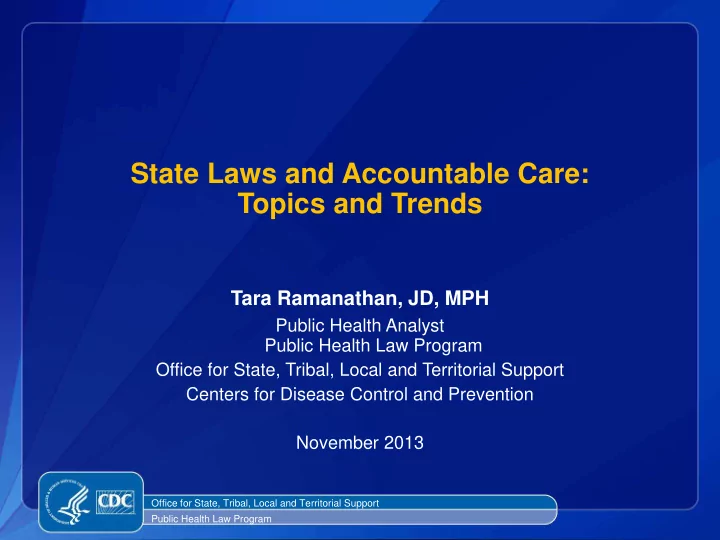

State Laws and Accountable Care: Topics and Trends Tara Ramanathan, JD, MPH Public Health Analyst Public Health Law Program Office for State, Tribal, Local and Territorial Support Centers for Disease Control and Prevention November 2013 Office for State, Tribal, Local and Territorial Support Public Health Law Program
Dis iscla laim imer The contents of this presentation do not represent official CDC determinations or policies. The findings and conclusions in this report are those of the authors and do not necessarily represent the official position of CDC. The contents are for educational purposes only and are not intended as a substitute for professional legal advice. Always seek the advice of an attorney or other qualified professional with any questions you may have regarding a legal matter.
Federal-State Authorities and the ACA • The US Constitution confers a limited set of enumerated federal powers, for example: • Regulate interstate commerce • Tax and spend • Federal government shapes state/local public health through funding • 10 th Amendment affirms other powers are reserved to the states
The Role of Law in Accountable Care ACA § 3022: Medicare Shared Savings Program allows ACO-affiliated providers and suppliers to become eligible for additional payments upon meeting savings and quality requirements 42 CFR Part 425.20: An ACO is a legal entity recognized and authorized under applicable state, federal, or tribal law, identified by a Taxpayer Identification Number, and formed by one or more eligible participants
Why Talk About ACOs Under State Laws? State law provisions define the role of Social service programs State public health departments State-local government relations State laws incorporate the concept of ACOs into state Medicaid provisions through Express authorization Pilot programs State plan amendments or 1115 waivers State laws are rapidly changing
State Law Domains Authority Finances Broad authority to regulate Payment structure Agency oversight Risk sharing structure Permissive or mandatory program Compliance and accountability Coverage Accountable for performance or Eligible population customer satisfaction Specific health conditions Quality or outcome measures Delivery system Sanctions or ejectment Specific providers Checks and balances Patient-centered medical home Consumer protections Unique licensure or certification Evaluation required Data management Rural/geographic dispersal EHRs required of providers issues Patient consent to data collection Limitations Provision for multi-payer database Waiver of antitrust laws State funding mechanism
Results of Legal Review: Number of States With Relevant Provisions States With States Without Broad authority to regulate 15 8 Agency Specific agency oversight 20 3 Authority Mandatory inclusion 8 15 Eligible population specified 18 5 Coverage Certain conditions specified 8 15 Specific providers required 7 16 Delivery Patient-centered medical home 6 17 System required Unique licensure/certification 1 22 EHRs required of providers 2 21 Data Patient consent to data 0 23 Management collection Multi-payer databases 3 20
Results of Legal Review: Number of States With Relevant Provisions States With States Without Payment structure specified 5 18 Finances Risk sharing structure 4 19 Accountable for performance 6 17 or customer satisfaction Compliance Quality or outcomes 5 18 and Accountability measures Sanctions or ejectment 2 21 Consumer protections 7 16 Checks and Evaluations required 9 14 Balances Geographic issues 4 19 addressed Waiver of state antitrust laws 3 20 Limitations State funding mechanism 11 12 specified
Future Research Questions How should states prioritize population health concerns in Medicaid ACOs? Will state health agencies participate as providers in Medicaid ACOs? As some states consider merging health departments with social service agencies that run Medicaid, will ACOs prioritize population health activities differently? What happens if Medicaid ACOs cannot meet quality or cost benchmarks?
Thank you! Tara Ramanathan irt2@cdc.gov (404) 498-0455 For more information, please contact CDC’s Office for State, Tribal, Local and Territorial Support 4770 Buford Highway NE, Mailstop E-70, Atlanta, GA 30341 Telephone: 1-800-CDC-INFO (232-4636)/TTY: 1-888-232-6348 E-mail: OSTLTSfeedback@cdc.gov Web: http://www.cdc.gov/stltpublichealth The findings and conclusions in this presentation are those of the authors and do not necessarily represent the official position of the Centers for Disease Control and Prevention. Office for State, Tribal, Local and Territorial Support Public Health Law Program
Recommend
More recommend